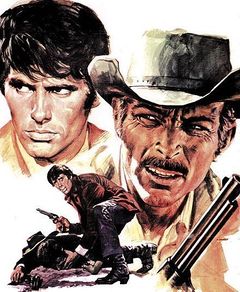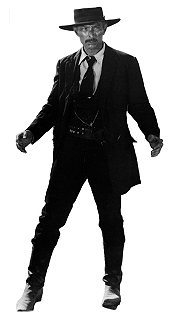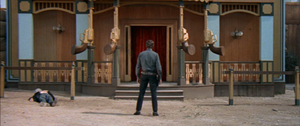Day of Anger Review (Scherpschutter) - EXTRA page

|
Versions, Titles, VHS & DVDs
When I first saw Day of Anger, on VHS, it ran only for about 80 minutes; the Dutch title of the release was De Dagen van Geweld, which translates as The Days of Violence. A similar truncated version was released on VHS in Great Britain under the title Gunlaw. According to a bilingual poster, it was released in Belgium theatrically as On m'appelle Saligo, meaning They call me Saligo. I've never seen the French language version, but 'sale' meaning 'dirty' in French, I suppose this 'man called Saligo' is Scott Mary, the one who's doing the dirty jobs. The title was also used, so it turns out, for the French VHS. Today Le Dernier Jour de la Colère (The last day of anger) is the most common title of the movie in the French speaking world. In Germany it was, understandably, called Der Tod ritt Dienstags, Death rode on a tuesday, after the infamous novel nobody had ever read. Oddly enough the now commonly used English title 'Day of Anger' is not a correct translation of the original title, I Giorni dell'Ira. The plural form 'giorni' has become singular in English (the alternative Days of Wrath is more correct). Most probably somebody had simply misread the original title. Morphologically Italian is a very complex language, and even the basic rules for plural forms are confusing.
The Wild East release has been out of print for quite a while, and the DVD has become one of the most wanted releases in the wonderful world of spaghettis. If you do not object to their policies (it has been quite an issue here) the Cult Cine disc is an alternative; they used the video of the French (PAL) release and tried to synch it up to the Wild East (NTSC) audio-track, leading to some lip-synch problems and hick-ups in the soundtrack department. Otherwise they did a more than decent job. The French DVD from Seven7 has no English language options; it offers French and Italian audio and only French subtitles; the image is reasonably clean, but with its faded colors the print looks a little anemic. The Italian Medusa release has a bit more film grain, but also far more vivid colors; like the French release, it has no English language options. The only audio track is Italian. Apart from the superior video quality, the Italian subtitles might be an extra reason to purchase the disc for those studying or willing to learn Italian. The recent German release offers German and Italian language options and German subtitles. All the above-mentioned releases have a running time of about 109 minutes. Strictly speaking, none of them is uncut. A couple of very minor cuts were made to remove print damage (notably were originally the reels had to be changed) and most releases seem to miss one brief dialogue scene.
- For a review of the Wild East release see: Day of Anger DVD review
- A (German language) review of the German Disc: Der Tod ritt dienstags DVD review
- Screenshot comparison Wild East v. Seven7: http://www.spaghettiwesterndvds.com/movies/day-of-anger-i-giorni-dellira/screenshots/
The Missing Scene
http://www.youtube.com/watch?v=N9dQydVuW3E
This seems to be the scene missing from most releases. Instead of two minutes (as mentioned on the Cult Cine site) it lasts only 34 seconds. It's part of a longer scene, appearing rather late into the movie, after the opening of the Casino. Scott (Gemma) goes outside, turns to the left and meets the newly appointed deputies in the street. But in this clip (at the 19 seconds point), he's suddenly addressed by Murph and turns around. The scene is definitely taken from another source
- Translation of the German dialogue:
Murph: "Scott!"
Scott: "What do you want?"
Murph: "Do you absolutely want to get killed, my boy?"
Scott: "Oh, shut up! I don't believe of word of it."
Murph: "You'll see, he'll only interfere when there's no danger for him."
Scott: "You can tell me what you want, but I've got things to do;"
Murph: "Listen, if I were you I wouldn't step into these affairs"
Scott: "Ahhh"
The Colonel & his Sons
When Sergio Leone contemplated Lee van Cleef for the part of Colonel Mortimer, he reckoned the actor was in his late forties, forty-eight or forty-nine, or even fifty (1), the ideal age for the Colonel. In reality van Cleef was only forty, no more than five years older than Clint Eastwood. They were nevertheless presented as belonging to different generations: Eastwood is called 'boy' by Van Cleef, while the latter is addressed as 'Old Man' by the younger person. In other words: the partnership also was a kind of father-son relationship. The part turned Van Cleef into the ideal father figure of the spaghetti western.
Both Ryan from Death rides a Horse and Talby from Day of Anger are descendants of the Colonel, with the movies deliberately using Van Cleef's ambiguity and authority as an actor in a master-pupil/father-son plot (2). But there are a few alterations. While Mortimer was an obsessed man, Ryan and Talby are more sociable personalities. Mortimer seems to have no future because he is obsessed by what happened in the past. He is literally consumed by the thought of revenge: what keeps him alive, is the idea of killing the man responsible for the death of his beloved sister. When he has killed El Indio, his mission is accomplished, the very thought that kept him alive, has dissolved. Although he is a bounty hunter, he doesn't want the money that was put on the heads of El Indio and his men: he takes the watch (literally the memory of his sister) and rides off into the sunset (3). Ryan and Talby, quite on the contrary, seem to be looking for a future; both men are middle aged and feel their powers are fading. Not the past, but the future worries them. They are preparing for old age.
Apart from the master-pupil plotline, the movies have a few background motifs in common: in both cases Lee plays a man who has a score to settle with a couple of former partners in crime who have double-crossed him, and in both cases these men have become respected citizens, pillars of the community they live in. At the same time, the characters of Ryan and Talby are each other's opposites: Ryan is a rascal, but he's also insecure and deep inside he's a decent man. Talby, on the other hand, is charming and self-assured, and although he remains vulnerable (if in the hour of death) he's essentially a cold and ruthless person. As a result, the relationship with the younger man is different: to Ryan, Bill (John-Philip Law) becomes the son he never had, a person he really cares for; to Talby, Scott (Giuliano Gemma) is in the first place a man who will eventually be able to fill his boots, a replacement killer. While in Giulio Petroni's Death Rides a Horse feelings of rage and vengeance (Ryan was present at the killing of the younger man's family) turn into friendship and mutual understanding, in Valerii's movie friendship eventually turns into rivalry and hatred.
In many of his later spaghetti westerns Van Cleef was paired with a younger actor (in Beyond the Law with Antonio Sabàto), in The Grand Duel to Peter O'Brien, but the quality of the scripts he was offered was in decline Lee quickly lost interest in the things he was doing. Working in the desert heat and his daily quantity of booze did him no good either, and within a couple of years, the man who already looked old for his age, became an old man. Ironically, he would eventually be cast as a grandpa next to a kid in God's Gun.
- (1) Christopher Frayling, Sergio Leone, Once upon a Time in Italy, p. 85
- (2) Kevin Grant, Any Gun Can Play, p. 88
- (3) See also my essay Ghosts and Avengers, paragraph # Harmonica and Mortimer
Screenshots from the Italian Medusa DVD
The screenshots are thumb nails.
Most DVD releases have a couple of audio problems and the Italian disc is no exception. The audio has a reduced bitrate (192 kb/sec), but that shouldn't be the problem; however it's rather low on volume and in some spots conversations are barely comprehensible. On those occasions there are also a few (rather serious) lip-synch problems, so I guess the audio for these parts was taken from a different source (probably VHS).
Corresponding Page:
--By Scherpschutter















